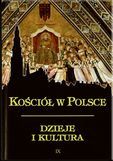ZNACZENIE TRYDENCKIEGO DEKRETU Z 1563 R. O OBOWIĄZKU TWORZENIA SEMINARIÓW DUCHOWNYCH
The Significance of the 1563 Tridentine Decree on the Obligation to Create Priestly Formation Seminaries
Author(s): Jan KopiecSubject(s): History
Published by: Katolicki Uniwersytet Lubelski Jana Pawła II - Wydział Teologii
Keywords: Tridentine Council; priesthood; seminary
Summary/Abstract: The subject of this presentation is a reflection on the long historical journey of the Catholic Church introducing a standardized system of formation for future priests, who are sent to pastoral ministry work in parishes. In antiquity and the Middle Ages, no standardized, common system of forming candidates to the priesthood existed for the entire Church. Support came from the Christian community and family environment, supported by help from local pastor and the bishop. The first initiatives toward this goal are evident particularly since the time of Carol the Great (died 804), but this was not a set rule for the whole Church. Models of monastic and cathedral schools demanded a high degree of intelligence, and in regards to future priests, they set minimum requirements, sufficient for administering the sacraments and transferring the elementary principles of faith. Under the influence of 14th and 15th century humanism, during the period when various religious movements arose, formation of Catholic clergy appeared to be insufficient. The progressing reformation deepened this problem. Due to this, toward the end of the Tridentine Council in 1563, the decree project required diocesan bishops to found priestly formation seminaries in which candidates to the priesthood were to complete theology studies and spiritual formation in communities.
Journal: Kościół w Polsce. Dzieje i kultura
- Issue Year: 2012
- Issue No: 11
- Page Range: 47-55
- Page Count: 9
- Language: Polish

